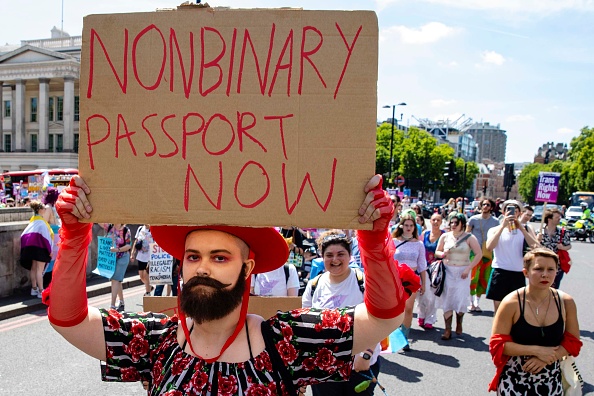
SCOTLAND’s government has introduced a ground-breaking five-year plan to enhance the well-being of non-binary individuals— in a move which is the first of its kind in the UK.
The plan includes backing for research on the experiences of non-binary people, training for fertility preservation providers on trans and non-binary healthcare needs, and guidelines for simplifying name changes in public services.
Non-binary individuals don’t strictly identify as male or female and may see their gender as fluid or non-existent.
The plan has received support from seven national LGBTQ+ organisations, including Scottish Trans, Equality Network, LGBT Youth Scotland, Stonewall Scotland, LGBT Health and Wellbeing, LEAP Sports, and Time for Inclusive Education.
Stonewall, the largest LGBTQ+ rights organisation in Europe, praised the Scottish Government for becoming “the first government in the world” to publish an action plan of this kind.
In a statement on Twitter/X, the charity said: “We applaud the Scottish Government on becoming the first government in the world to publish a time-bound range of deliverable actions specifically for non-binary people.
“We are supportive of the plan and welcome the Scottish Government’s efforts to respond to the Working Group on Non-Binary Equality’s recommendations within their proposed actions.”
This initiative follows the Scottish Government’s decision not to extend legal gender recognition to non-binary individuals through changes to the Gender Recognition Act, based on recommendations from the Working Group on Non-Binary Equality.
MOTORSPORT UK, the governing body of UK motorsport, introduces a new Transgender Inclusion policy to foster a positive and welcoming space for the transgender community in the sport.
The policy, unveiled during Transgender Awareness Week, embraces non-binary, gender fluid, intersex, and trans individuals, including competitors, officials, marshals, staff, committee members, and partners.

Hugh Chambers, CEO for Motorsport UK, commented: “Motorsport UK embraces an inclusion-centred approach. We are very proud to be able to stand with the transgender community to promote an environment that champions inclusion, dignity and respect, and the right for everyone to Self-Identify. Putting a policy down in writing sets out a clear position: everyone is welcome.”
Key commitments include treating everyone with dignity, allowing self-identification of gender in licensing, maintaining privacy during transitions, raising awareness among stakeholders, and providing resources for clubs to support members of all genders.
The policy stems from Motorsport UK’s LGBTQ+ Expert Committee, formed as part of their Equality, Diversity & Inclusion Policy, and collaborates with Racing Pride, a leading international movement promoting LGBTQ+ inclusion in motorsport.
THE LATEST US Equal Employment Opportunity Commission (EEOC) report highlights significant pay gaps and leadership underrepresentation in the federal workforce, particularly affecting American Indian and Alaska Native (AIAN) women, African American women, and Hispanic women and Latinas.
Despite double the participation rate in the federal workforce compared to the civilian labour force, AIAN and African American women earned significantly less than their counterparts.
AIAN women, had a median annual salary of $56,432 (£45,301), $22,800 (£18,302) less than all women federal employees.
While Hispanic women had lower participation rates, they resigned at a rate nearly twice the average for all government employees.
African American women, representing 11.7 per cent of the federal workforce, were underrepresented as supervisors, managers, and executives, showcasing persistent disparities.
AIAN women were proportionally represented among managers but only accounted for 0.4 per cent of executives.
Hispanic women held first-line supervisory positions at a higher rate but were underrepresented in managerial and executive roles.
LAW FIRMS, including Wall Street’s Simpson Thacher and Paul Weiss, are establishing equity, diversity, and inclusion (EDI) practices in response to the Supreme Court’s ban on affirmative action in college admissions.
The firms recognise a growing demand for these services as clients seek guidance on racial equity audits and the legal viability of diversity initiatives post the Supreme Court decision.
This marks a second wave of EDI practices, with the first initiated after George Floyd’s death in 2020, when firms were tasked with designing effective EDI programmes.
Now, companies are looking to safeguard their initiatives against conservative challenges, following the Supreme Court’s decision in Students for Fair Admissions v Harvard.
Recent actions, such as America First Legal’s complaint against Nascar and Rev Racing, reveal a broader trend of legal challenges against diversity programs, prompting law firms to respond to the evolving landscape.